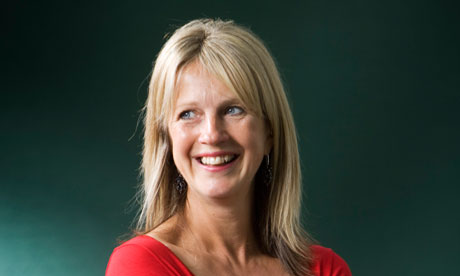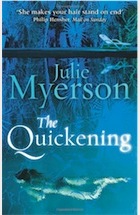Julie Myerson's venture into genre fiction will please horror enthusiasts and her regular readers alike

Julie Myerson's style adapts easily to horror. Photograph: Murdo Macleod for the Observer
There is a perennial debate that occurs in the literary world, as regular as spring tulips but a good deal more frequent, concerning the thorny issue of genre. Critics often talk about literary versus commercial fiction as if it's a bit like smoking or non-smoking: you're one or the other. Writers themselves rarely sign up to this polarisation: most are writing the books that are in their hearts, to the best of their abilities – and then handing them over to their publisher, whose job it is to apply the label.
 In an interesting exercise, the once-famous horror movie company Hammer, in partnership with Arrow books, has taken three well-known literary voices and given them the challenge of writing genre fiction, contributing to a series of books loosely based on a horror theme in the old-fashioned Hammer sense, ie psychological horror rather than the torture-porn version that does depressingly well in film. Helen Dunmore and Jeanette Winterson have already produced Hammer novellas and now it's the turn of Julie Myerson, with a gripping tale of a honeymoon couple in the Caribbean being haunted by spirits and strange events that turn out to have their origins very close to home.
In an interesting exercise, the once-famous horror movie company Hammer, in partnership with Arrow books, has taken three well-known literary voices and given them the challenge of writing genre fiction, contributing to a series of books loosely based on a horror theme in the old-fashioned Hammer sense, ie psychological horror rather than the torture-porn version that does depressingly well in film. Helen Dunmore and Jeanette Winterson have already produced Hammer novellas and now it's the turn of Julie Myerson, with a gripping tale of a honeymoon couple in the Caribbean being haunted by spirits and strange events that turn out to have their origins very close to home.
Rachel and Dan arrive on a beautiful island for the holiday of a lifetime – newly wed, newly pregnant – but even before they check in to their luxurious hotel, the locals are warning Rachel that her husband is in danger. Rachel is soon haunted by poltergeists, nightmares and a malign figure with soil in his face and hair. When staff at the hotel begin to be murdered, the threat becomes much more concrete.
Myerson couldn't be a better choice for this sort of book: her novels have been full with ghosts, real and imagined, often as functions of a heroine's disordered mind. Her first book, Sleepwalking, was published 20 years ago but I can still remember the chilling image of a dead grandfather looming over a newborn baby's cot as the mother frantically bats the apparition away. Sleepwalking was as much about inheritance as spirits – the terrifying thought that when we produce our own children we bequeath them, unwittingly, the way in which we were raised ourselves. The Quickening may be a specific commission but it is still Sleepwalking's grandchild, parented by Myerson's intervening novels, particularly Laura Blundy and The Story of You.
Full review
 In an interesting exercise, the once-famous horror movie company Hammer, in partnership with Arrow books, has taken three well-known literary voices and given them the challenge of writing genre fiction, contributing to a series of books loosely based on a horror theme in the old-fashioned Hammer sense, ie psychological horror rather than the torture-porn version that does depressingly well in film. Helen Dunmore and Jeanette Winterson have already produced Hammer novellas and now it's the turn of Julie Myerson, with a gripping tale of a honeymoon couple in the Caribbean being haunted by spirits and strange events that turn out to have their origins very close to home.
In an interesting exercise, the once-famous horror movie company Hammer, in partnership with Arrow books, has taken three well-known literary voices and given them the challenge of writing genre fiction, contributing to a series of books loosely based on a horror theme in the old-fashioned Hammer sense, ie psychological horror rather than the torture-porn version that does depressingly well in film. Helen Dunmore and Jeanette Winterson have already produced Hammer novellas and now it's the turn of Julie Myerson, with a gripping tale of a honeymoon couple in the Caribbean being haunted by spirits and strange events that turn out to have their origins very close to home.Rachel and Dan arrive on a beautiful island for the holiday of a lifetime – newly wed, newly pregnant – but even before they check in to their luxurious hotel, the locals are warning Rachel that her husband is in danger. Rachel is soon haunted by poltergeists, nightmares and a malign figure with soil in his face and hair. When staff at the hotel begin to be murdered, the threat becomes much more concrete.
Myerson couldn't be a better choice for this sort of book: her novels have been full with ghosts, real and imagined, often as functions of a heroine's disordered mind. Her first book, Sleepwalking, was published 20 years ago but I can still remember the chilling image of a dead grandfather looming over a newborn baby's cot as the mother frantically bats the apparition away. Sleepwalking was as much about inheritance as spirits – the terrifying thought that when we produce our own children we bequeath them, unwittingly, the way in which we were raised ourselves. The Quickening may be a specific commission but it is still Sleepwalking's grandchild, parented by Myerson's intervening novels, particularly Laura Blundy and The Story of You.
Full review

No comments:
Post a Comment